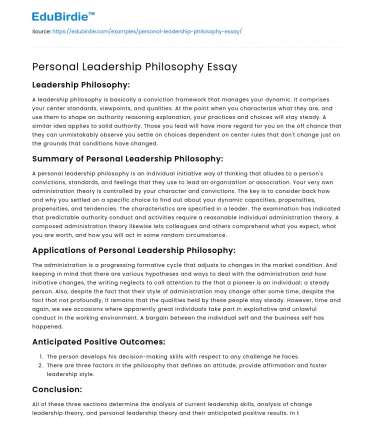Introduction
Leadership is an art that requires a nuanced understanding of oneself and the environment in which one operates. A personal leadership philosophy serves as a guiding compass, reflecting one’s values, beliefs, and principles that shape decision-making and behavior. This essay delves into the intricacies of formulating a personal leadership philosophy, anchored in the fundamental belief that authentic leadership emerges from a deep-seated understanding of oneself. By dissecting the components that form this philosophy, exploring real-life examples, and addressing potential counter-arguments, this essay aims to demonstrate the importance of such a philosophy in effective leadership. In a world characterized by rapid change and complexity, having a clear leadership philosophy not only provides direction and consistency but also fosters trust and respect among followers, thereby enhancing overall organizational efficacy.
Understanding the Components of a Leadership Philosophy
A personal leadership philosophy is comprised of several key components: core values, vision, and behavior. Core values are the fundamental beliefs that guide a leader's actions and decisions. According to Kouzes and Posner (2017), understanding one’s core values is vital as they act as the foundation upon which trust is built. A leader who values integrity, for instance, will consistently demonstrate honesty and transparency in their dealings, thereby gaining the trust of their team. Vision, another crucial component, represents the leader's aspirations for the future. A compelling vision provides direction and inspires followers to strive towards common goals. John F. Kennedy’s vision of landing a man on the moon is a classic example that galvanized a nation and propelled technological advancements.
Save your time!
We can take care of your essay
- Proper editing and formatting
- Free revision, title page, and bibliography
- Flexible prices and money-back guarantee
Behavior, the third component, is the outward manifestation of a leader's values and vision. Effective leaders model the behavior they wish to see in others, serving as role models. As noted by Bandura’s social learning theory (1977), individuals are more likely to emulate behaviors observed in admired leaders. For instance, a leader who consistently demonstrates empathy and active listening will cultivate a culture of mutual respect and understanding. However, critics argue that a rigid adherence to a predefined set of values and behaviors may stifle adaptability. Yet, a well-crafted leadership philosophy should be dynamic, allowing for evolution in response to changing circumstances while remaining anchored in core principles. This balance ensures leaders remain authentic yet adaptable, fostering resilience in the face of adversity.
The Role of Self-Reflection in Leadership Development
Self-reflection is a pivotal practice in the development of a personal leadership philosophy. It involves a deliberate process of introspection where leaders evaluate their experiences, actions, and outcomes. As emphasized by Peter Drucker, "Follow effective action with quiet reflection. From the quiet reflection will come even more effective action." Through self-reflection, leaders gain insights into their strengths and weaknesses, allowing them to refine their leadership style. For example, a leader reflecting on a failed project might realize the need for improved communication and take proactive steps to develop this skill.
Moreover, self-reflection encourages continuous personal growth, as it challenges leaders to question their assumptions and biases. This openness to learning is crucial in an ever-changing environment where leaders must navigate complex and diverse challenges. However, the process of self-reflection can be uncomfortable, as it requires confronting one’s limitations and failures. Critics argue that excessive self-reflection may lead to overthinking and inaction. To mitigate this, leaders should balance reflection with action, ensuring that insights gained are translated into tangible improvements. By integrating reflection into their leadership practice, leaders can cultivate a philosophy that is both introspective and action-oriented, driving sustainable personal and organizational growth.
Applying Leadership Philosophy in Practice
Translating a personal leadership philosophy into practice involves aligning one's leadership approach with the established values and principles. This alignment is critical in building credibility and authenticity as a leader. For instance, if a leader prioritizes innovation as a core value, they must foster an environment that encourages risk-taking and creativity. Google's 20% time policy, which allows employees to spend a portion of their work hours on passion projects, exemplifies how organizational practices can reflect leadership values, thereby driving innovation and employee engagement.
Furthermore, applying a leadership philosophy requires effective communication, as it ensures that the leader’s vision and values are understood and embraced by the team. Leaders must articulate their philosophy clearly and consistently, reinforcing the shared purpose and goals. However, challenges may arise when individual values within a team conflict with the leader’s philosophy. In such cases, it is essential for leaders to demonstrate flexibility and foster dialogue, creating a culture of inclusion where diverse perspectives are valued. By navigating these challenges with empathy and understanding, leaders can build cohesive teams that are aligned with their leadership philosophy, ultimately enhancing organizational performance.
Conclusion
In conclusion, a personal leadership philosophy is an essential tool for navigating the complexities of modern leadership. By understanding its core components, engaging in self-reflection, and applying it in practice, leaders can cultivate authenticity, inspire trust, and drive organizational success. While challenges such as rigidity and conflicting values may arise, a dynamic and inclusive approach to leadership philosophy ensures adaptability and resilience. As the landscape of leadership continues to evolve, a well-defined personal leadership philosophy remains a critical asset for leaders striving to make a meaningful impact. Ultimately, by embodying their philosophy, leaders not only enhance their effectiveness but also leave a lasting legacy that inspires future generations.






 Stuck on your essay?
Stuck on your essay?

